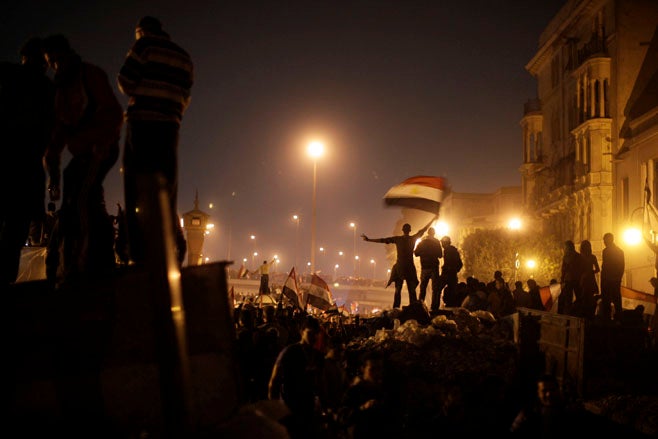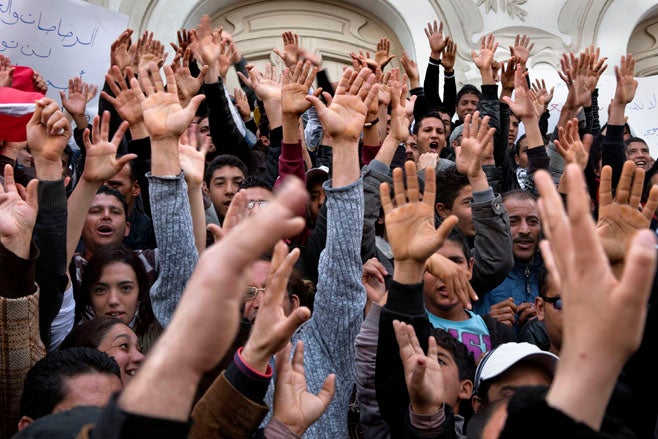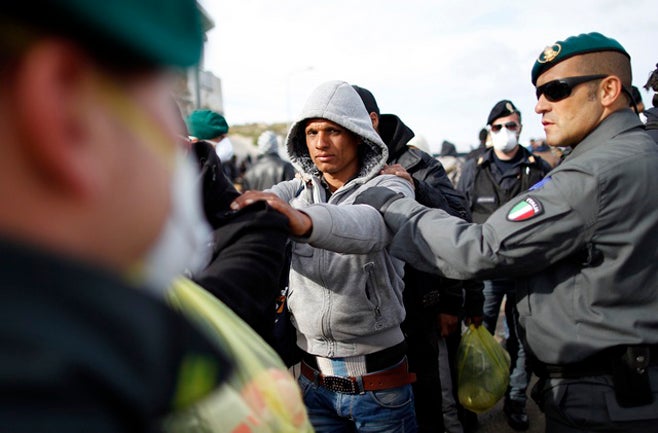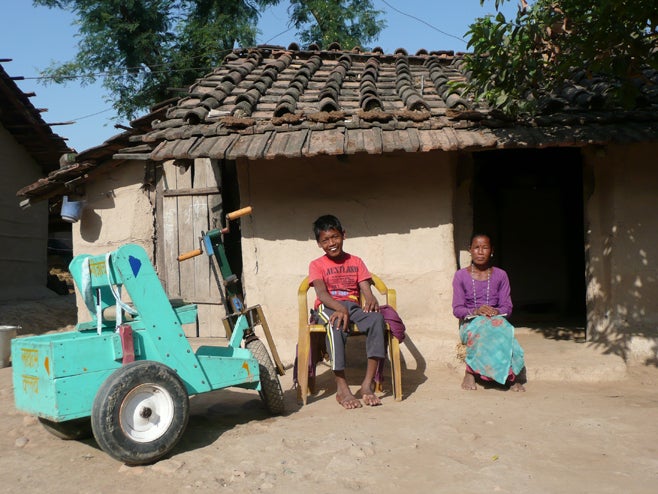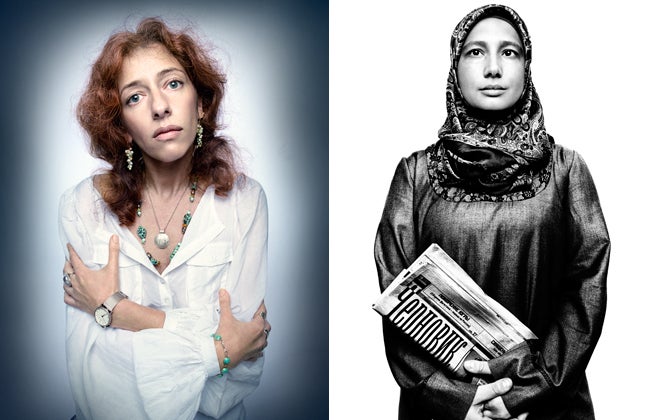Serbia made little discernible progress on human rights issues in 2011, despite the European Parliament in January ratifying the European Union's Stabilization and Association Agreement with Serbia, and the arrests of Ratko Mladic and Goran Hadzic, the two remaining fugitives wanted by the International Criminal Tribunal for the former Yugoslavia (ICTY). The situation of ethnic minorities remains concerning, independent journalists face threats and violence, and the weak asylum system needs reform. Rising tensions with Kosovo have exacerbated Serbia’s dialogue with the EU.
In late July the Kosovo government sent armored units to Kosovo’s northern border, populated by Kosovo Serbs, in an unsuccessful attempt to seize control of two crossing points. Local Serbs erected roadblocks to stop them and a shootout erupted, killing one Kosovo policeman. In late August German Chancellor Angela Merkel visited Belgrade and warned Serbian authorities they must normalize relations with Kosovo for Serbia to move closer to EU membership.
War Crimes Accountability
In May and July, respectively, the two remaining ICTY war crimes suspects Ratko Mladic, wartime Bosnian Serb military commander, and Goran Hadzic, wartime leader of the Croatian Serb separatist forces, were arrested on Serbian soil, ending the long period of impunity for war crimes committed in Bosnia and Herzegovina and Croatia. In his visit to Serbia in September, ICTY Chief Prosecutor Serge Brammertz commended the Serbian government for arresting Mladic and Hadzic, but also stressed the importance of Serbia's technical cooperation with the tribunal regarding ongoing trials. Additionally, he underlined the importance of regional cooperation in prosecuting war criminals.
Domestic war crimes prosecutions have proceeded steadily, although the Serbian War Crimes Chamber has faced increasing criticism for limited progress in domestic war-related criminal proceedings, and for indictments of individuals for war crimes that were eventually dropped due to lack of evidence.
In March Jovan Divjak, a Bosnian army wartime general, was arrested by Austrian police under a Serbian arrest warrant in Austria over charges that he committed war crimes in 1991 against Yugoslav People’s Army (JNA) troops on Dobrovoljacka Street in Sarajevo. Many NGOs and NGO spokespeople, including the president of the Helsinki Committee of Serbia, condemned the indictment as shameful and provocative, especially because Divjak is an active member of the NGO community. The Korneuburg District Court in Austria declined Serbia’s request for extradition, and Divjak was released in July. There have been several other high-profile indictments and arrests for war crimes against the JNA—including against Ejup Ganic, former de facto Bosnian vice-president during the war, and Ilija Jurisic, former wartime high ranking official in the Ministry of Interior—all of which were eventually dropped due to lack of evidence and pressure from NGOs and government officials.
Freedom of Media
Hostile acts against independent
In January and February the Insider televisionshowreported in a series entitled “Fraud of the Century” on alleged financial abuses in the mining basin of Kolubara, near the town of Lazarevac. In an apparent act of intimidation after the report, unknown perpetrators in Lazarevac put up posters “announcing” the death of Insider journalists.
Danilo Zuza and Milos Mladenovic, who are believed to be associated with extremist nationalist groups, were arrested for the July 2010 beating of Teofil Pancic, a political commentator. In September 2010 they were sentenced to three months in prison, although the legally proscribed penalty for the crime is six months to five years. However, due to their lack of previous criminal records and their ages (both 20-years-old) they were sentenced below the legal minimum. Pancic appealed the low sentences. In November the Court of Appeals in Belgrade sentenced Mladenovic and Zuza to seven additional months.
Serbia's government is currently examining a long-awaited draft law on media strategy forwarded by the Ministry of Culture. Journalist NGOs and associations in Serbia have criticized the draft for allowing continued state ownership of media and for what they say are inadequate safeguards against political interference regarding media content.
Treatment of Minorities
Roma continue to suffer discrimination and attacks. In March a Roma boy was repeatedly verbally insulted and beaten outside his high school; the young men responsible were arrested but have not yet been charged. In a similar incident in May three individuals beat a young Roma adult in a Belgrade bus. They have been arrested but not yet charged.
Roma families living in informal settlements in Belgrade face forced evictions with little access to alternative housing. Twelve Roma families were evicted from their homes under Pancevo Bridge in June without notice. Police escorted them to the outskirts of Belgrade to live in metal containers without sanitation or electricity. Five families were evicted from their homes in Skadarska Street, Belgrade, and spent the next night sleeping in city parks, despite a coalition of 22 NGOs urging the authorities to provide alternative housing.
Human Rights Defenders
A gay rights pride parade set for October 2 was cancelled over fears of mass violence. Police security assessments showed there could have been riots and clashes between extremist right-wing groups and marchers. Many local and international NGOs accused the authorities of giving into threats and for not adequately tackling hate speech. In her statement, Antje Rothemund, head of the Council of Europe Office in Belgrade, said she was deeply concerned about the degree of hatred and violence in Serbian society that led to the event’s cancellation.
In April 2011 a Serbian court sentenced far right leader Mladen Obradovic to two years in prison for inciting violence during the 2010 gay pride march. Belgrade's Higher Court ruled that Obradovic, leader of extremist group Honor, used violence to disrupt the gathering in order to incite hatred and discrimination. The court sentenced 13 others to prison terms of 8 to 18 months. Gay activists and liberals said the sentences were important as the first ever in Serbia for discrimination against gays, but complained they were too lenient.
Asylum Seekers and Internally Displaced Persons
Serbia’s law on asylum went into effect in April 2008, transferring the power for making asylum decisions from theOffice of the United Nations High Commissioner for Refugees(UNHCR) to the Serbian asylum office. According to Ministry of Interior figures, 2,134 asylum seekers were registered in Serbia between the start of January and end of August, a striking jump from 522 in 2010. The rise appears to be due to an influx of migrants through Greece, Turkey, and Macedonia. There are currently two centers for asylum seekers in Banja Koviljaca and Bogovadja in Serbia; the one in Bogovadja opened in June and is already at capacity. There have been no reports of poor treatment or abuse so far, but UNHCR reports that overcrowding is likely.
In March the Serbian Commissariat for Refugees and Internally Displaced People (IDP), in cooperation with UNHCR, published an IDP vulnerability assessment. It showed there were 73,358 refugees in Serbia, most of them of Croatian origin, and 97,286 persons from Kosovo with displacement-related needs in Serbia.
UNHCR reported in March that Serbia (including Kosovo) sent 28,900 asylum seekers to Europe and North America in 2010. The largest group of asylum seekers in the world in 2010 were from Serbia (including Kosovo), according to UNHCR. According to Serbia’s minister of interior, 95 percent of Serbian asylum applicants in Western European countries belong to ethnic minorities, many of them Roma of Serbian and Kosovo origin.
Key International Actors
The European Parliament’s ratification of the EU's Stabilisation and Association Agreement with Serbia marked a key step toward the latter’s membership in the union. The resolution particularly underlined the importance of eliminating parallel structures in the north of Kosovo and the need to improve treatment of minorities.
In October the European Commission recommended that Serbia become a candidate to join the EU “on the understanding that Serbia reengages on the dialogue with Kosovo .” The accompanying progress report commended Serbia’s judicial reform efforts and improved legal and policy frameworks for human rights protection, but called for greater efforts to counter threats and violence against journalists and the media and to improve the status of Roma.
Following a review in March the UN Committee on the Elimination of Racial Discrimination urged Serbian authorities to halt forced evictions for Roma and improve their access to education and registration. In a September report on Serbia Thomas Hammarberg, Council of Europe commissioner for human rights, stressed the need to counter hate speech by extreme right groups, ensure protection of journalists, and improve human rights for Roma.
Kosovo
Kosovo’s human rights situation improved little in 2011, amid faltering negotiations with Serbia and tensions between Serbs and Albanians at the northern border that sometimes led to violence. The justice system remained weak, despite efforts to prosecute individuals for corruption and war crimes. Kosovo’s Roma, Ashkali, and Egyptian (an Albanian speaking group with supposed origins in Egypt) remained marginalized and vulnerable to discrimination. General elections in December 2010 occurred without violence, but were marred by irregularities that international observers said called the results into question.
Protection of Minorities
Roma, Ashkali, and Egyptians continued to face persistent discrimination—particularly in housing and access to public services—and the highest unemployment, school dropout, and mortality rates in Kosovo.
Following an accidental fire in January in their social housing apartments in Plementina, approximately 250 Roma, Ashkali, and Egyptians were forced to move to a makeshift camp in town without electricity and consistent access to running water. During the summer there was a water shortage at the camp. At this writing repairs to their apartments had yet to be completed and they remained in the temporary camp.
Tensions between Serbs and Albanians in northern Kosovo intensified in August, after Kosovo authorities occupied border stations on the Serbia border. Serbs in northern Kosovo held blockades and protests that persisted until November, with one fatality, a Kosovo police officer killed by Serb protestors in a border skirmish in late July. In September sixteen Serbs and four peacekeepers from the NATO-led Kosovo Force (KFOR) were injured in a confrontation over Serb blockades near border crossings.
Local prosecutors received reports of 60 inter-ethnic incidents during the first nine months of 2011, according to the Kosovo prosecutor’s office. Reports from the UN Mission in Kosovo indicated that although most were low-level incidents, including vandalism at religious sites in January and February, they included a number of serious assaults and murders.
A Serb man was shot dead and his son wounded in a village in Orahovac municipality in October. At this writing the police had yet to make arrests. A Serb man was shot dead and three Serbs, including a police officer, were injured in an incident in Mitrovica in November. Police were investigating at this writing.
In October the Organization for Security and Co-operation in Europe (OSCE) called on Kosovo authorities to do more to protect Serb returnees to a village in Ferizaj municipality after an arson attack on an Orthodox cemetery in October and a spate of burglary and looting since August.
Return of Refugees and Internally Displaced Persons
In March UNHCR reported that Serbia and Kosovo produced the highest number of asylum applicants in “industrialized” countries in 2010. The trend was attributed to the EU visa liberalization with Serbia and the economic problems and discrimination that minorities face in Kosovo. Most claims were lodged in Europe. According to UNHCR, many claimants were Roma, Ashkali, and Egyptians from Kosovo. Almost all were rejected.
UNHCR Kosovo registered a total of 695 voluntary minority returns in the first seven months of the year, a decline from the peak in 2010: 237 Serb, 76 Roma, 187 Ashkali and Egyptian, 36 Bosniak, 68 Gorani, 12 Albanian (to Serbian majority areas, mainly Mitrovica), and 7 Montenegrins.
Deportations of Kosovars from Western Europe continued, with little assistance for returnees once in Kosovo. According to UNHCR, 1,334 Kosovars were deported from Western Europe during the first seven months of 2011, including 336 people to areas where they were in a minority: 168 Roma, 76 Ashkali, 5 Egyptians, 22 Bosniaks, 8 Gorani, 3 Turks, 16 Albanians, and 38 Serbs.
Deportations continued to disproportionately impact Roma, Ashkali, and Egyptian communities, with most returnees living in informal settlements and lacking basic utilities such as running water and electricity. The UN Children’s Fund reported in August that most Roma, Ashkali, and Egyptian children returned to Kosovo were now on the national registry, giving them a legal right to access education and other social services. Three-quarters still do not attend school due to poverty, curriculum differences, and language barriers.
The state of North Rhine-Westphalia, which hosts the largest number of Kosovo Roma, Ashkali, and Egyptians in Germany, suspended forced returns of Roma, Ashkali, and Egyptians for the winter months of 2010 and 2011, due to concerns about their safety in Kosovo. Forced returns from North Rhine-Westphalia resumed in April 2011, although more nuanced assessments introduced in September 2010 meant that school-age children were less likely to be deported.
Activists and Roma leaders voiced concerns in March and April 2011 about lack of treatment for poisoning for most former inhabitants of a lead-contaminated camp in Mitrovica that closed in October 2010. A similar lead-contaminated camp at Osterode remained open as approximately 20 families remaining there feared violence and discrimination if they returned to their former homes in southern Mitrovica. In July 2011 the authorities in north Mitrovica reached an agreement with Mercy Corps and the European Commission to provide land for homes for these families.
Impunity, Accountability, and Access to Justice
The partial retrial at the ICTY of Ramush Haradinaj, former Kosovo prime minister, and Idriz Balaj and Lahi Brahimaj, Kosovo Liberation Army (KLA) commanders, began in August on charges related to wartime prisoner abuse at a KLA detention facility. A key prosecution witness who had declined to testify in the first trial again refused to give evidence citing fears over his safety, reawakening concerns over witness security that the ICTY appeals chamber had cited when ordering the retrial.
In January the Parliamentary Assembly of the Council of Europe adopted a report by Swiss parliamentarian Dick Marty, alleging that some KLA members, including current senior officials in Kosovo, had participated in the post-war abductions, enforced disappearances, and killing of Serbs, as well as alleged organ trafficking and organized crime including weapons and drug smuggling. In May the EU approved a special task force in its Rule of Law and Police Mission in Kosovo (EULEX) to investigate the allegations. In August EULEX appointed an experienced American prosecutor to head the investigation.
In October the trial of seven Kosovoar Albanians accused of separate allegations of organ trafficking and human trafficking, known as the Medicus case, opened in Pristina. The defendants are accused of luring donors from poor countries to Kosovo with false promises of high payments for their kidneys.
During the period from July 2010 to June 2011, EULEX completed five war crime cases, with three more ongoing and 67 in pre-trial stages.
The war crimes prosecution of Fatmir Limaj, a Kosovo member of parliament in the ruling party, was delayed from March until September because of confusion about whether he had parliamentary immunity from prosecution. In September the Constitutional Court of Kosovo ruled that lawmakers are not immune from prosecution and a district court ordered him placed under house arrest. Limaj is accused of torturing and killing Serbian and Albanian prisoners in the town of Klecka in 1999.
The impending trial faced a setback in late September when a key witness under witness protection, Agim Zogaj, was found dead in a park in Germany. While German police investigations indicated suicide, Zogaj’s family criticized the protection offered to him by EULEX and said Zogaj had been under intense pressure. The Office of the UN High Commissioner for Human Rights noted that the case highlighted the wider challenge of effective witness protection in Kosovo.
Freedom of Media
In an open letter in February Christopher Dell, the United States ambassador to Kosovo, accused three media outlets—Koha Ditore, Koha Vision TV, and Express—of illegal conduct after they obtained and reported on text messages and a tape recorded conversation between Ambassador Dell and Kosovo politicians during that month’s presidential elections. The Independent Media Commission in Kosovo cleared the three publications of wrongdoing the same month. In March Reporters without Borders criticized Dell’s intervention as “unacceptable harassment.”
In August EULEX issued indictments against Rexhep Hoti and four other staff at the Kosovo daily Infopress after threats made in the paper in May and June 2009 against a prominent journalist, Jeta Xharra. The threats followed Xharra’s reporting on threats to media freedom in Kosovo. The indicted individuals could face up to five years in prison if convicted.
Human Rights Defenders
The EULEX Human Rights Review Panel (HRRP), an advisory body that adjudicates claims brought by individuals against EULEX, issued its first decision in April (an employment case) and a second in June (non-implementation of a court judgment) finding that EULEX had breached property rights in both and the right to fair hearing in the second.
Key International Actors
In February the head of the UN Mission in Kosovo, Lamberto Zannier, highlighted before the Security Council the need for a speedy investigation into war crimes and organ trafficking allegations in the Council of Europe report. He also noted “widespread irregularities and manipulation of votes” during the December 2010 elections. Election irregularities were also criticized in January by Ulrike Lunacek, the European Parliament rapporteur on Kosovo.
The Committee for the Prevention of Torture, a Council of Europe body, released a report in October after a July visit that found persistent ill-treatment in Kosovo police custody and lack of legal safeguards for those forcibly placed in psychiatric facilities.
In October the European Commission's annual progress report highlighted “serious shortcomings” in the December 2010 elections and the need for greater efforts to tackle organized crime, citing “weak” witness protection as a particular obstacle. The report noted lack of progress on refugees and IDP returns, and difficult conditions for displaced persons. It called on the authorities to do more to tackle access to “education, healthcare, housing and social protection” for Roma, Ashkali, and Egyptians.
